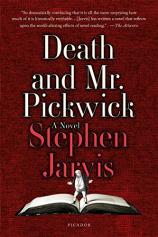Excerpt
Excerpt
Death and Mr. Pickwick

The fire’s rays alone lit the parlour’s gloom when I took my seat by the hearth. I am sure I betrayed some signs of nervousness to my interviewer, as I cast my eyes over the many shelves and cabinets, whose contents flickered in the firelight: he said that I should feel free to ask about anything on display. I saw a duelling pistol with the sign ‘Loaded’ underneath, as well as a stuffed rook in a pose of great fright and a stagecoach bugle with a crushed and glinting horn.
‘Perhaps you could tell me the significance of some of the items,’ said my interviewer. To encourage me to speak, he added: ‘I keep that bugle because it makes me wonder how it became that way.’ He twisted in his armchair on the opposite side of the hearth, for a better angle upon the shelf where the bugle stood. The firelight flashed upon his spectacles, which were circular. ‘I was amused when the last candidate suggested I had sat upon it.’
He was indeed an enormous man, and a bald and sweating one too, and he lifted the spectacles to wipe under the frame. ‘And that’s justice in former times,’ he said, noticing that I was looking above the hearth, where there was a display of antique truncheons arranged in declining size, like pan pipes, from an enormous wooden pole, two and a half feet long, to a short and brutal stub with a thick brass ferrule. ‘Perhaps you could tell me some stories about heads they might have cracked,’ he said.
Before I could attempt an answer, he started to explain that, if he took me on, I would have to get used to his many quirks – one of which was to keep the fire in the parlour alight all year round, including in the middle of May, the time of this interview – but he was interrupted as the door at the end of the room opened. ‘Ah, our drinks,’ he said, hearing the handle turn behind him.
A curly-haired maid, who had the least deferential face of any servant I had ever encountered in my life – a face that practically radiated cheek and cheerfulness – brought in a lacquered tray bearing two tankards, and with every click of her heels she proclaimed her independence. Her livery was a blouse of vertical black and white stripes and a tight black skirt. Though my attention was drawn to her, I also glimpsed, when the door opened, a well-lit room at the end of the passage: I saw an easel, and a flip chart bearing writing and dates, as though set up for a lecture, and the heading: ‘Where is Chapman’s friend?’
‘Our guest will be interrogated over supper,’ he said to the maid as she set down the drinks. ‘What fare can we offer him, Mary?’
‘You just say what you want after I decide what you’re getting, sir, and everything will be fine.’ She winked at me and left.
‘I interviewed many a maid before I found her,’ he said. ‘Just as I have interviewed many before you. So – to the most important question. How well do you know the immortal work?’
‘I have read it – I would say – ten times completely, but on many occasions I have read parts, especially when I have been sick in bed.’
A disappointment spread over the fat man’s features. ‘That’s a great shame,’ he said, exhaling in a rude and noisy expression of frustration. ‘I had been hoping you’d be the one who’d say “by heart”.’
* * *
It was rook pie that night. Rook, I discovered, is gamey, but not as strong as pigeon.
‘Some old countrymen,’ he remarked, as we sat at the table in the small candlelit dining room, ‘will tell you that May the thirteenth is the perfect day for your gun, when the young rooks emerge from the nest.’
‘I know that,’ I said, ‘but I also know the rook is protected by law these days.’
He eyed me suspiciously. ‘These fowls were found in the road – run over.’
‘Then I am afraid that this bird collected some strange pebbles in its crop.’
I reached into my mouth and pulled out the metal pellet I had bitten upon. It was the second. The first I had placed discreetly on my plate when the fat man was in a reverie of chewing, but this second I placed in full view, a tiny black sphere on the white tablecloth. I prodded it forward, so it trundled towards him like a miniature marble, and rolled under his plate. ‘Shooting rooks has been outlawed since 1981,’ I said. ‘I know, because I went out shooting last May, just to see what it was like. Unfortunately, the police were tipped off before I reached the rookery. I was released with a caution.’
He put down his knife and fork and leant back in his chair, looking at me with more interest than at any previous moment. I may have been nervous at the start, but I was confident now. And I knew I was hired. I had not been out shooting, I might add, but I did know about the law, and as soon as I bit the pellet, I guessed how to make the job my own.
* * *
In the ten years since that meeting, I have worked my way through the collection of books, papers, pictures, correspondence and notes the fat man had accumulated, over the course of many years, in his substantial house. The house itself he had chosen for its previous occupation, for until the early twentieth century it was used for the production of churchwarden pipes, and was probably one of the last such workshops. One can still lift the corner of a carpet and see, in the grooves between the floorboards, traces of white pipeclay dust.
I was employed to produce the work which I lay before you now. I have edited some parts, written others. The sustained period of sitting and writing has had a physical effect – for time and snacking have swollen my once athletic form. My shirts are larger these days, my belt buckle is no longer visible under my stomach. These effects would undoubtedly make me more respectable, as an author, in the fat man’s eyes.
He decided that I would write under the pseudonym ‘Inscriptino’, a printer’s error from early copies of the first edition of ‘the immortal work’, a corruption of the word ‘inscription’. Often, in our late-night conversations by the fire, he would shorten my pseudonym to Scripty. As for himself, he wished to be known as ‘Mr Inbelicate’, derived from another printer’s error, this time for ‘indelicate’. He explained, once I was appointed, that my duty was to correct historical errors, until, at some moment in the future, on the very day when my duty was completed, there would be a renaming ceremony, and a chinking of tankards, and we would say as a toast: ‘To indelicate’ and ‘To inscription’.
The renaming was not possible. For Mr Inbelicate died seven years ago. I believe he feared his time was short when he appointed me. ‘I shall never be an indelicate old man,’ he said, his frail voice emerging from his thin and wasted body, in his bed, towards the end, ‘but you must become an inscription.’
Mr Inbelicate bequeathed me his house and monetary assets as well as his maid – and I duly married the latter. Her name is not really Mary, it was the name he had chosen, but it has become her name, for I am so used to it.
Every May, she still serves me rook pie – though it is rook served with one of her winks, and bears a strong resemblance to pigeon.
Copyright © 2015 by Wordaholic Ltd.
Death and Mr. Pickwick
- Genres: Fiction, Historical Fiction
- paperback: 816 pages
- Publisher: Picador
- ISBN-10: 1250094666
- ISBN-13: 9781250094667




